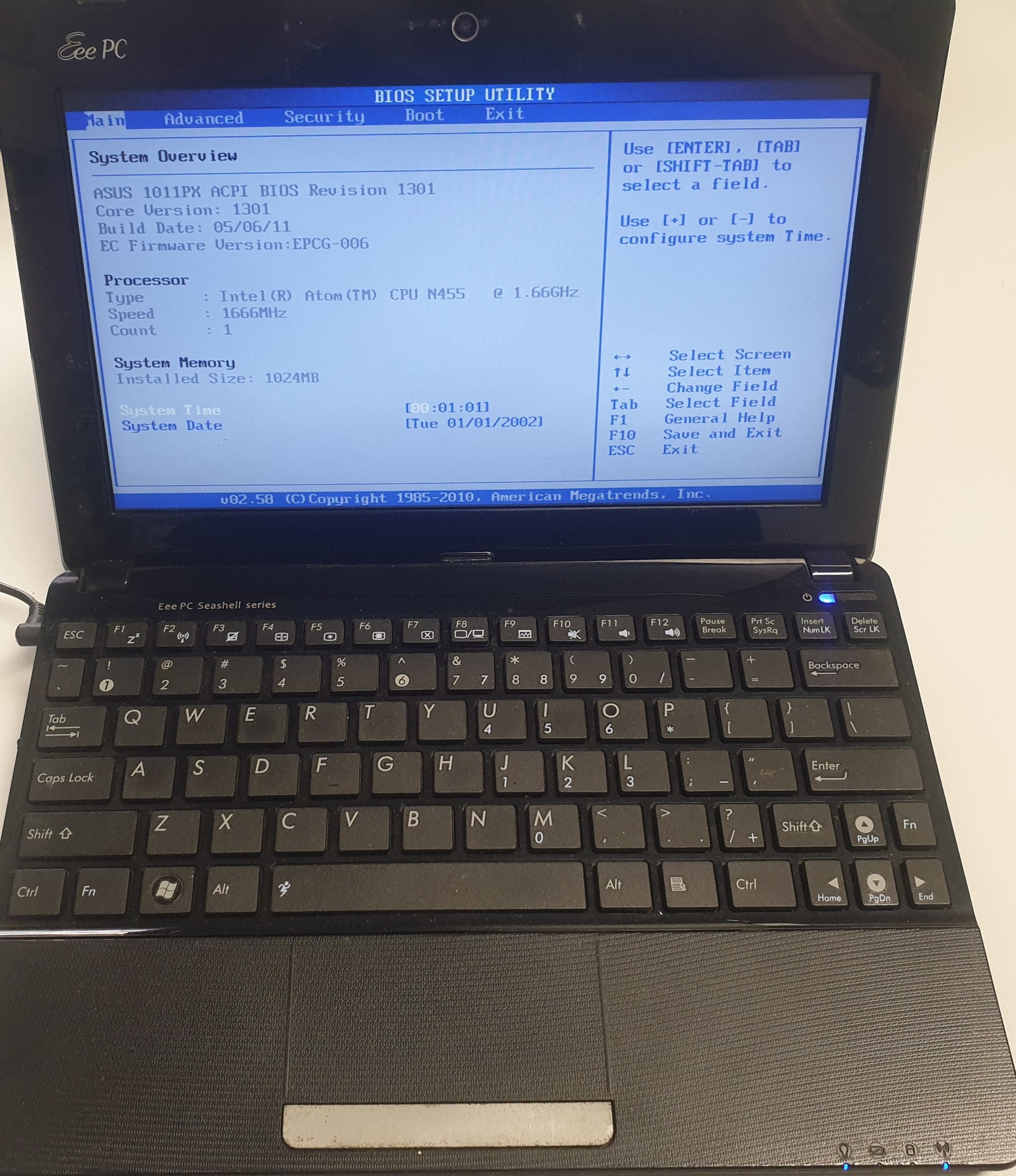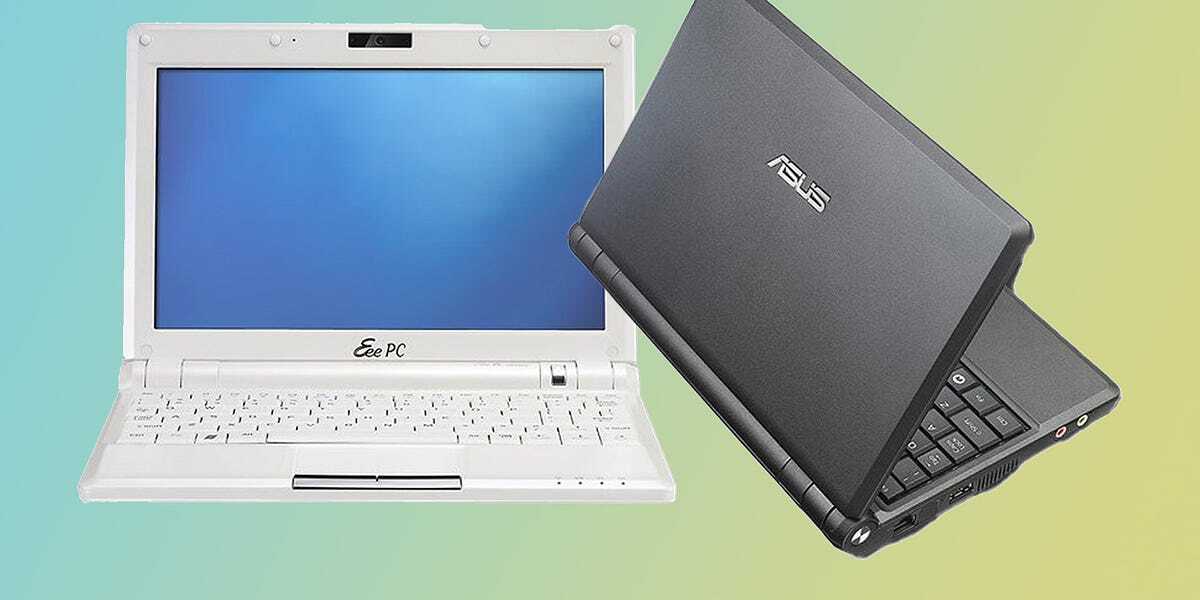- cross-posted to:
- linux@lemmy.ml
- cross-posted to:
- linux@lemmy.ml
For a hot minute, I had a 9-inch screen Dell laptop that could barely run Windows 7.
These small form factor PCs were pretty cool at the time, I remember loving the little thing.
A good stepping stone product, but netbooks weren’t destined to last long. Beyond the rosie tint of nostalgia, it was a pretty impractical device. Good enough display for DVD video, but no dvd drive or enough onboard storage to handle a selection of movies (at an acceptable encoding for the time, at least). Big enough to require a flat surface or a lap to type on but not powerful enough to justify it, and a very cramped typing surface at that.
Eventually they got replaced by tablets/convertibles, large phones, and ultrabooks. And all much better platforms in all ways, IMO.
I think you’re missing the key thing that netbooks did. Specifically: new, cheap, low power, and mobile cheap computing.
It didn’t matter how underpowered it was. Prior to the original netbook, the ASUS EEE 7", the alternative cheapest new computer you could buy was $600-$700. There was second hand computers cheaper, but they were a grab bag of reliability or results of abuse from the previous unknown owner.
These days that same niche is filled with $100 smartphones and $25 SoC comptuers like Raspberry Pi, but back then the EEE was a game changer for buying a computer, any computer, new for cheap.
Many of those other devices you mentioned had a market because the cheap netbook proved the market existed and was under served.
I was writing up a pretty similar comment at the same time… I totally agree here.
I’d say they were more killed by Chromebooks than anything else. They were both cheap, generally small, and fulfilled approximately the same use cases. Chromebooks basically just did what ASUS was trying to do but better, and with more choices in models.
The one thing is finding 7 inch Chromebooks was harder, they landed more around 10 or 11 so they were more after the larger EEEs, but IMO that was what killed them.
I’d agree with most of this, but I don’t think I’d argue they were ever replaced by anything else, just that the use case is too narrow.
Tablets are generally larger, have flappy keyboards if keyboards at all, are way more expensive, don’t have a built in mouse and often don’t support mice well, and they run a mobile OS, not a desktop OS. They are very different products solving very different problems. If you argue netbooks were just for playing movies, sure, but that’s not how I viewed them at all, especially since there were portable DVD players in the same form factor available for many years before netbooks existed. If that was the use case, there’d be no reason to run windows or have a keyboard.
I don’t see how they replace a large phone at all - a large phone is a much smaller screen and fits in your pocket. And makes calls. And is a touch screen. And has mobile internet access. They’re no where near the same thing.
Ultra books I think is the closest “replacement” here, but I’d argue it’s more of an evolution and/or a hybridization with a regular laptop.
I’d actually argue Chromebooks were the killer here. They still take notes well, are portable, cheap, have first party mouse support, are generally smaller and lighter weight, and are more type-able than both netbooks and tablets.
I think we only liked them as enthusiasts, but for the general public (say a student) they were very bad because being cheap meant they had crappy hardware just like modern Chromebooks. In fact, I’ve been interested in having a Chromebook lately that could run Android apps, but quickly realized a good one is as expensive as a good laptop in Brazil.
I hated mine, just to balance the prior comment.
At the time there was no other way to get on the internet on the move than this except laptops which were really expensive then. This thing with a USB UMTS modem was just the coolest shit.
Lol, Dell had a tiny laptop in the late 90’s,was pretty slick. External CD and floppy. Ran NT4 great, and Win2k pretty well from what I recall.
HP had their “book” series then (850/650?), with a pop-out mouse. LOVED that thing. Ran 95, I think. Two PCCARD hot swap bays, double stack, so you could run 2 hard drives.
I remember the loud as fuck little fans and the barely running windows 7
I was the build engineer that assembled the OS for these things between 2008-2010. It was a Debian based Linux distro with a custom built desktop and other custom built software, and it my memory serves my right, it was using the IceWM window manager.
That was my first real experience with Linux!
My little brother bought one open box from Best Buy. Somehow it didn’t have keyboard or trackpad drivers? Not even external usb would work.
Ended up putting Ubuntu on it for him I believe. Fun learning experience.
LoL yeah, I had a couple. A 10" and a 7". I ended up putting Ubuntu on there as well with xfce. It was perfect for streaming and doing a few web tasks. The hardware was crap though.
You could buy one with Windows XP back then but boy was it terrible.
Very cool. Any other related stories?
Yeah! When I joined the team, the build system was basically a bunch of Bash scripts duct taped together so to speak. It would fail all the time and everyone was unhappy. Devs couldn’t get a solid image, nor could the QA team have a product that they were sure they could reproduce. The build team all quit out of frustration because everyone was blaming them all the time for delays and it wasn’t even their fault because they didn’t write the scripts.
Some intern started another script but left early in his project. He didn’t transfer anything to anyone and we basically had to take out his hard drive to connect it to my system to extract his scripts because he didn’t bother to give anyone the password to his machine.
I still had to redo everything from scratch because his scripts somehow only worked on his system and were not portable.
Over the course of one year, I rebuilt the whole thing from the ground up. And in the end, it was a mix of Python, Bash, Perl and it was using chroot jails and Qemu as a containerization system before Docker even existed. In the end, I could build a Linux distribution with any suite of software for multiple architecture using a simple config file. I had a master system that acted as a monitor and a load balancer that would delegate the builds to whatever machine or container was available and give me real time information on the progress of each build.
Then the company went bankrupt.
I was going to say that sounds like quite the elegant setup you ended up with, and in a pre docker world? Straight up crazy in my eyes. Really puts into perspective how I take all the tolling around containerization for granted nowadays.
And then when I have a job interview, they ask my how long I’ve been working with Docker. I tell them only a couple of years. They always say it’s not enough. Then I ask them if they know about chroot jails and debootstrap and how to assign resources using cgroups and they don’t even know that I’m taking about… SMH
deleted by creator
I wish these would come back. I loooove tiny PCs, and use the smallest everything I can get almost everywhere. Small phones, Small cars, Small computers.
The GPD Win has everything I want, but I can’t afford the $1400 they want for the 10". I miss these being available for the $100-$200 mark.
The GPD Win isn’t really the same as these though. It’s trying to provide the most gaming performance possible in a tiny package. It’s a premium device, rather than a tiny, budget oriented laptop.
Try AliExpress.
Wish the 11" was more prevelant. 11" with a decent camera, battery, fanless, and light weight would be amazing device
Suspect ARM based too
Tablets took the place of these in the market place. They just don’t have (or need) the attached keyboards anymore.
If you want an 11” ARM netbook, just get a Galaxy Tab and a Bluetooth keyboard stand.
In the marketplace, but not my heart. Being x86 I could install Arch and openbox and it rocked. I’ve owned an ARM laptop, and it isn’t the same.
I also absolutely abhor touch screen interfaces. Bluetooth means it won’t be easy to debug boot issues either
Did you check out the HP Stream 11"?
Fanless, descent battery, camera, light and small. Best feature: Full size keyboard with a mostly standard layout and sd card slot. The display is a little weak but good enough for one person usage. I would not use it with Windows 11 (tried and it was painfully slow), but running Fedora Linux I can use it mostly like my desktop machine.
(Typing on this machine right now. ;-))
They were unbearably slow even back then. I returned my 1000H with its Atom N270 after a day and saved a little more money until I was able to afford a 2008 MacBook. Never regretted it. On the contrary, this marked my complete move to MacOS which saved me from continuing to use Windows.
You returned a $200 netbook and only needed a little more money to get an $1100 MacBook?
I paid 430€ for the Eee and I paid 1100€ for the MacBook. Sure that‘s not just a little more money.
However, the way I calculate such purchases is: price divided by years of usage. I used the MacBook as a main computer for four years until I could afford a more powerful Mac mini as my desktop computer. I continued to use my MacBook intensively for university and for mobile photo editing for another five years. This means a total lifespan of nine years or 122€ per year.
If I had stalled my decision not to send back the Eee and try working with it ignoring the shortcomings, I maybe would have used it for a year or a couple of months longer. The netbook trend, according to my recollection was quite short so I guess I couldn‘t have sold it for a good price then.
So what I actually wanted to say is that the MacBook, despite it costing more than double, was by far the better deal for me.
I had a 1000HE. Worked well enough for web browsing. Granted, I swapped out the hard drive for an SSD. On the other hand, it was a terrible SSD. One of the first gen ocz ones.
I still have my 1000H from 2010 and even used it for school and uni right up until 2019 when I no longer was doing on campus work and I could do everything on my desktop.
Granted, I went down the rabbit hole of Linux on it around the 2015 mark because Windows 7 onwards was too much for it, and it always had overheating issues, but it aided my Linux addiction and was the very laptop that got me interested in programming so I personally am happy I kept it.
That being said, I also totally get why a MacBook was just a much better value propositions, and if mine wasn’t my 10th birthday present I probably would’ve loved doing the same thing.
Had a 100X EEE PC, for my use cases they where totally usable, but of course I installed Linux with a lightweight desktop environment on them. It was even possible to run Docker containers and virtualize Windows XP.
My 701 with 2gb ram and extended battery still works. I used to go wardriving with that thing!
I still have one of those in the basement. No idea if it works, though. It was really awesome in its day.
I still have my Eee 901 sitting around with my collection of old tech. It actually booted up a couple years ago when I last checked it! Used the crap out of it back in college for computer science classes, since all I really needed was a terminal.
These would be great once arm chips become more of a thing on PC. Love the form factor.
I wish Apple would bring the 11” MacBook Air back again. I still occasionally look to pick an old one up for fun but never pulled the trigger.
I’m in the same boat, really wanting a 2015 11" MBA to go with my 2015 13" MBP, but ultimately I decided on fixing up a 12" Latitude 7280 I got from e-waste (looked to be water damaged, keyboard was unreliable and battery would die at 40%). So far it’s been pretty great, and will likely entirely replace my MBP while also being more convenient to carry around.
I still have one from ~10yrs ago and it still works! Its been through the wars, upgraded RAM and SSD, but it dual boots windows 7 (no judge plz) and ubuntu (i said no judge!).
I use it mostly to watch youtube video guides in the workshop when Im working on stuff and dont want dust and sparks inside my regular laptop.
Edit:

I hear Ubuntu is the best version of Linux is that correct?.
“Best” is very subjective, particularly about Linux.
Are you just wanting to experiment with Linux, and don’t have much in the way of a “tech” background? Do you want a distro that more or less works right away after installation? Then Ubuntu (or one of its many derivatives) is probably the better choice for you. (I personally like Mint).
Are you a power user who compiles drivers for fun? Do you think that starting your PC after uninstalling your bootloader sounds like a cool puzzle to solve? Then you’ll probably find Ubuntu too restrictive.
Gottem
It’s a very popular and user friendly distro, often recommended for beginners.
But it’s not just a beginner distro, it is also very versatile/powerful and well supported. So it can be used just as well by experienced power users.The reasons to use other distros is not so much about what you can do, but more about how it is done.
I still have my HP Mini311, 11.6", 1366x768 screen, I put 3GB of DDR3 ram, 120GB SSD, overclocked it to 2GHz, put a 2.4/5GHz wifi card, installed MX (Xfce) linux on it, still works fine. Best thing is that this netbook has a discrete nvidia GPU that can decode 1080P in hardware, and a HDMI plug so you can even plug it on a TV. In 2009 it was incredible to do this with a small form factor like this!
It came with Windows XP, For fun I installed Win10Pro 32bits on it, oh god… it’s so slow it’s incredible.
I had used computers back since I was a kid in the 90s with my families 95 then 98 machine, and finally XP. But MY first computer and introduction to tinkering with software was an EEE pc 1005HAB. Atom processor, 2gb ram, and WiFi. I loved the thing. Best of all, I discovered it had compatibility (but not power) to run TF2 on it, which was so much better on PC than console. I spent hours finding ways to overclock it, mod the game to be as lightweight as possible, and eventually was able to play a game at a solid 30 fps so long as I played on the smallest map and used models that were only 50 polygons each. I installed Linux for the first time too, and so of course the next logical step was building my own pc. The rest is history I suppose…
The netbook era was right when I was getting into PC tech stuff. Had a dell mini 10 hackentosh/windows dual boot setup. Also remember trying to run the web version of Minecraft on it and needing to stick the netbook into my mini fridge freezer to precool it for longer playtimes before it would thermal throttle. What a weird time.
deleted by creator
deleted by creator
That’s what I used mine for as well, basically full linux support out of the box with Backtrack. Perfect timing since I was taking a computer security program at the time, and it was right at the tail end of people still using WEP.
My 12’’ was the great computer that was with me most of the time I was in university. Great little machine and portable as fuck.














